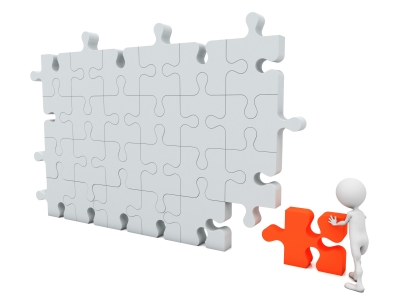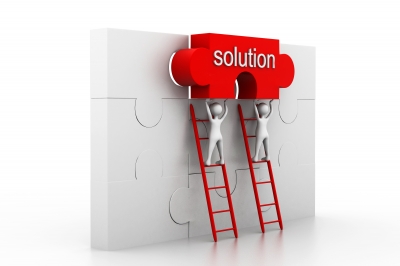1 min read
What Does ERP Stand For? 9 Ways CRM Integration is Key to Adoption
There are many references to the importance of ERP and CRM integration in our 8 previous blogs written about "What Does ERP Stand For?" Today we are...
3 min read
Kathy Graham Thu, Oct 03, 2013

 In my 17 years of experience working in the ERP and CRM software industry on both the Sales and Marketing side, it's time to share some key benefits for a business when they accomplish a successful CRM implementation through integration. As a small and medium-sized business, it’s critical to have an integrated CRM system in order to reap the benefits of your CRM investment. A CRM system will not be used to its full potential when it requires more work to track activity, opportunity and customer interactions. The key to a successful CRM implementation is also adoption. People need to use the CRM system and use it religiously or the benefits of having a CRM and your investment in the software will be wasted. In order to have a successful plan for adoption, CRM integration is key. In our previous blog, What Does ERP Stand For? 9 Ways CRM Integration is Key to Adoption, we outlined 9 points of CRM integration that are critical for CRM success. Now we will cover the business benefits to investing in integration after you purchased a CRM system. If you are still considering what CRM system to select, we hope both blogs will also be helpful in making a decision for the CRM that fits best.
In my 17 years of experience working in the ERP and CRM software industry on both the Sales and Marketing side, it's time to share some key benefits for a business when they accomplish a successful CRM implementation through integration. As a small and medium-sized business, it’s critical to have an integrated CRM system in order to reap the benefits of your CRM investment. A CRM system will not be used to its full potential when it requires more work to track activity, opportunity and customer interactions. The key to a successful CRM implementation is also adoption. People need to use the CRM system and use it religiously or the benefits of having a CRM and your investment in the software will be wasted. In order to have a successful plan for adoption, CRM integration is key. In our previous blog, What Does ERP Stand For? 9 Ways CRM Integration is Key to Adoption, we outlined 9 points of CRM integration that are critical for CRM success. Now we will cover the business benefits to investing in integration after you purchased a CRM system. If you are still considering what CRM system to select, we hope both blogs will also be helpful in making a decision for the CRM that fits best.
So now that you have decided to incorporate a CRM system in your business, how do you accomplish integration and automation of tasks to boost productivity? The CRM selection process is critical in choosing the right fit for your business requirements. Some ERP systems like QuickBooks Enterprise have most CRM options that have been developed by outside developers not the publishers of QuickBooks. These CRM options are considered 3rd party integrations. In these cases, you want to make sure the 3rd party CRM has all the right hooks into QuickBooks, for example. Some ERP systems like Microsoft Dynamics CRM or Sage 100 CRM have incorporated CRM integrations within the publisher’s development team and are fully developed and supported by the publisher. In this case, you also want to make sure all the important integration points are there out-of-the-box. If not, there are ERP and CRM consultants and development specialists that can help develop integration with your CRM system and your other related fields in your ERP system wherever necessary. Here are few important ways an integrated CRM system will help your business grow. Other CRM benefits will be discussed in future blogs by ERP VAR.
1. Reduce Time Spent on Tasks Through Automation: When your CRM system is integrated to you other ERP systems, most manual data processing and duplication of efforts goes out the window! When employees have to manually populate a lead or customer information into CRM from another source it makes people want to scream, “There’s got to be something better!” Wasted time duplicating data from one system to another is not only a waste of valuable human resources, it’s also a big drain on productivity. You want sales people on the phone or in front of prospects and customers not duplicating data. Is your Outlook integrated where emails flow into CRM automatically? Are lead forms or landing pages that comes into your website integrated to your CRM such as an inquiry or a lead? When you invest in a CRM system and make sure it’s integrated, you will boost employee morale and productivity.
2. Tracking Marketing and Sales Activity Gives Insight into the Business Pipeline and More: The battle between Marketing and Sales is often rooted in the assumption that Sales believes Marketing spends too much money and generates poor quality leads. Marketing believes Sales has too much fun and doesn’t work hard enough to follow up with leads. When each stage of the customer lifecycle are clearly defined, you can set parameters on when an inquiry or when a lead continues to be nurtured with Marketing and when they are ready to be passed to Sales. This helps to avoid wasting your valuable sales peoples’ time and have them focus on quality leads.
3. Tracking Revenue Across Marketing and Sales: Often Marketing departments are not held to the same sales goals as the Sales department. This is a big mistake, in my opinion. When a CRM system is integrated the marketing and activities and sales can be tied back to proving ROI with each marketing. Now sales can be tracked to marketing campaigns and Marketing can even be held to a sales goal just like the Sales department. Now that’s smart-eketing!
These are just a few business benefits than an integrated CRM system will accomplish. Integration is key to a successful implementation of CRM in your business. You can find ERP and CRM consultants with the help of ERP VAR’s experienced team. Contact us to start the discussion today!
Photo courtesy of www.freedigitalphotos.net

1 min read
There are many references to the importance of ERP and CRM integration in our 8 previous blogs written about "What Does ERP Stand For?" Today we are...

Successful companies are always on the lookout for ways to boost productivity, reduce costs, make smarter decisions, manage growth, and gain a...

Written by Sage 100 ERP Consultant, Lloyd Smith with Mindover Software, Austin, TX Enterprise resource planning (ERP) as a business strategy and...